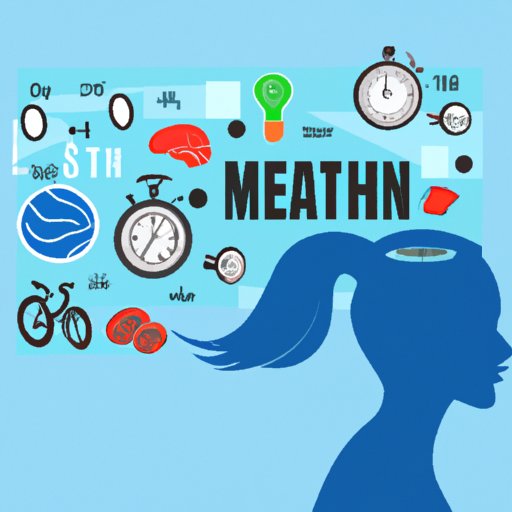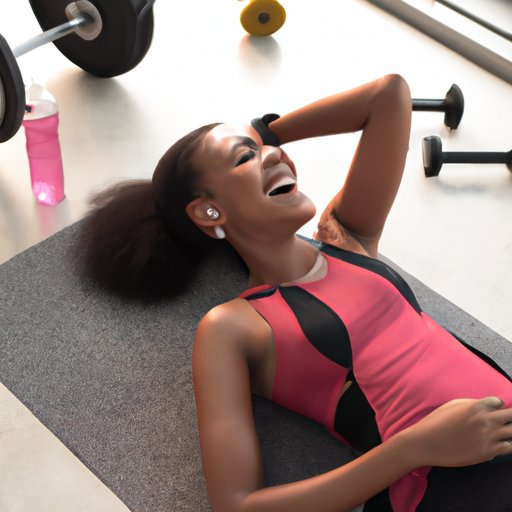Introduction
Feeling good after a workout is a common occurrence, yet the cause of this feeling is often not fully understood. From improving physical fitness to promoting mental wellbeing, there are numerous benefits of exercise that contribute to why we feel good after working out. In this article, we explore these various benefits and investigate the science behind why we feel good after a workout.
Exploring the Benefits of Exercise: How Working Out Makes You Feel Good
Exercise offers a range of physical and mental health benefits. Let’s take a closer look at some of these benefits and how they contribute to why we feel good after a workout.
Physical Benefits of Exercise
Regular exercise helps to improve overall physical fitness, strength and endurance. It also helps to reduce the risk of developing chronic health conditions such as type 2 diabetes, heart disease and obesity. As such, it is an important factor in maintaining good physical health.
Mental Health Benefits of Exercise
In addition to its physical health benefits, exercise has been found to have a positive effect on mental wellbeing. Studies have shown that regular exercise can help to reduce stress levels, improve sleep quality, boost self-confidence and even enhance cognitive function.

Examining the Mental Health Benefits of Exercise
Let’s take a closer look at the mental health benefits of exercise and how they contribute to why we feel good after a workout.
Stress Relief
Exercise has long been known to be an effective form of stress relief. Studies have found that physical activity can help to reduce cortisol levels, which is the hormone associated with stress. This reduction in cortisol levels can lead to improved mood and lower levels of anxiety.
Improved Sleep
Regular exercise has also been linked to better quality sleep. Studies have found that physical activity can help to reduce insomnia and other sleep disorders, leading to more restful nights and improved energy levels during the day.
Boosted Self-Confidence
Regular exercise has also been found to boost self-confidence. As you become fitter and stronger, your body image may improve, leading to increased feelings of self-worth and confidence.

The Science Behind Feeling Good After a Workout
Now that we’ve explored the physical and mental health benefits of exercise, let’s take a closer look at the science behind why we feel good after a workout.
Endorphins and Exercise
Endorphins are chemicals produced by the brain and are responsible for the “runner’s high” feeling experienced after a strenuous workout. Endorphins bind to opioid receptors in the brain, leading to feelings of euphoria and pleasure.
Mood-Boosting Hormones
As well as endorphins, exercise has also been found to boost levels of other mood-enhancing hormones, such as serotonin and dopamine. Serotonin is responsible for feelings of happiness and wellbeing, while dopamine is associated with feelings of motivation and pleasure.
Uncovering the Psychological Benefits of Exercise
In addition to the physical and mental health benefits of exercise, there are also psychological benefits that contribute to why we feel good after a workout.
Improved Focus and Concentration
Exercise has been found to improve focus and concentration, making it easier to stay on task and complete tasks more efficiently. This can lead to improved productivity and performance.
Enhanced Cognitive Function
Studies have also found that regular exercise can help to enhance cognitive function, leading to improved memory and learning capacity. This can be beneficial in both academic and professional settings.

Harnessing the Power of Endorphins Through Exercise
Endorphins are released through physical activity and are responsible for the feelings of euphoria and pleasure associated with exercise. Here, we explore ways to maximize endorphin release through exercise.
Types of Exercise that Release Endorphins
Any type of physical activity can trigger the release of endorphins. However, certain activities such as aerobic exercise, weight training and endurance sports have been found to be particularly effective. These activities tend to be more intense and require more effort than other forms of exercise, leading to greater endorphin release.
Ways to Maximize Endorphin Release
To maximize endorphin release, it is important to vary your workouts and challenge yourself. Increasing the intensity or duration of your workouts can help to further stimulate endorphin production, leading to greater feelings of euphoria and pleasure.
Exploring the Link Between Exercise and Mood Boosting Hormones
Exercise has also been found to increase levels of other mood-enhancing hormones, such as serotonin and dopamine. Let’s take a closer look at how exercise affects these hormones.
Serotonin and Exercise
Serotonin is a neurotransmitter that is responsible for feelings of happiness and wellbeing. Studies have found that physical activity can increase serotonin levels in the brain, leading to improved mood and reduced stress levels.
Dopamine and Exercise
Dopamine is another neurotransmitter that is associated with feelings of motivation and pleasure. Exercise has been found to increase dopamine levels in the brain, leading to improved focus and concentration.
Conclusion
From improved physical fitness to enhanced mental wellbeing, there are numerous benefits of exercise that contribute to why we feel good after a workout. Regular physical activity can help to reduce stress levels, improve sleep quality, boost self-confidence and even enhance cognitive function. On top of this, exercise also triggers the release of mood-boosting hormones such as endorphins, serotonin and dopamine. By harnessing the power of these hormones, we can maximize our feelings of euphoria and pleasure after a workout.
(Note: Is this article not meeting your expectations? Do you have knowledge or insights to share? Unlock new opportunities and expand your reach by joining our authors team. Click Registration to join us and share your expertise with our readers.)
